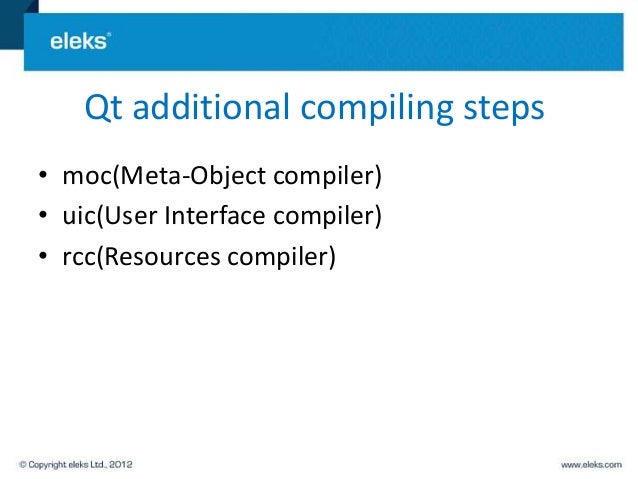The Meta-Object Compiler, moc, is the program that handles. The moc tool reads a C++ header file.
This page documents the Meta Object Compiler for the Qt GUI application framework. The moc reads one or more C++ class declarations from a C++ header or source file and generates one C++ source file containing meta object information for the classes. The C++ source file generated by the moc must be compiled and. Its role is to handle Qt's extension within the C++ code to offer introspection and enable reflection for Qt Signals and Slots, and for QML. The fact that your code is also read by another tool than the compiler does not make it less C++. The API and usability of the Qt meta object macro helps.
If it finds one or more class declarations that contain the macro, it produces a C++ source file containing the meta-object code for those classes. Among other things, meta-object code is required for the signals and slots mechanism, the run-time type information, and the dynamic property system.
The C++ source file generated by moc must be compiled and linked with the implementation of the class. If you use to create your makefiles, build rules will be included that call the moc when required, so you will not need to use the moc directly. For more background information on moc, see Usage moc is typically used with an input file containing class declarations like this. Moc_foo.cpp: foo.h moc $(DEFINES) $(INCPATH) $. Option Description -o Write output to rather than to standard output. -f[] Force the generation of an #include statement in the output.


This is the default for header files whose extension starts with H or h. This option is useful if you have header files that do not follow the standard naming conventions. The part is optional. -i Do not generate an #include statement in the output.
Ghostreader 1 6 5k To Miles. This may be used to run the moc on on a C++ file containing one or more class declarations. You should then #include the meta-object code in the.cpp file. -nw Do not generate any warnings.
(Not recommended.) -p Makes the moc prepend / to the file name in the generated #include statement. -I Add dir to the include path for header files. -E Preprocess only; do not generate meta-object code. -D[=] Define macro, with optional definition. -U Undefine macro. @ Read additional command-line options from. Each line of the file is treated as a single option.
Empty lines are ignored. Note that this option is not supported within the options file itself (i.e. An options file can't 'include' another file). -h Display the usage and the list of options.
-v Display moc's version number. -Fdir Mac OS X. Add the framework directory dir to the head of the list of directories to be searched for header files. These directories are interleaved with those specified by -I options and are scanned in a left-to-right order (see the manpage for gcc).
Normally, use -F /Library/Frameworks/ You can explicitly tell the moc not to parse parts of a header file. Moc defines the preprocessor symbol Q_MOC_RUN. Any code surrounded. #ifndef Q_MOC_RUN... #endif is skipped by the moc. Diagnostics moc will warn you about a number of dangerous or illegal constructs in the class declarations.
Wired That Way Personality Profile Pdf Converter there. If you get linkage errors in the final building phase of your program, saying that YourClass::className() is undefined or that YourClass lacks a vtable, something has been done wrong. Most often, you have forgotten to compile or #include the moc-generated C++ code, or (in the former case) include that object file in the link command.
If you use qmake, try rerunning it to update your makefile. This should do the trick. Limitations moc does not handle all of C++. The main problem is that class templates cannot have signals or slots.
Here is an example.